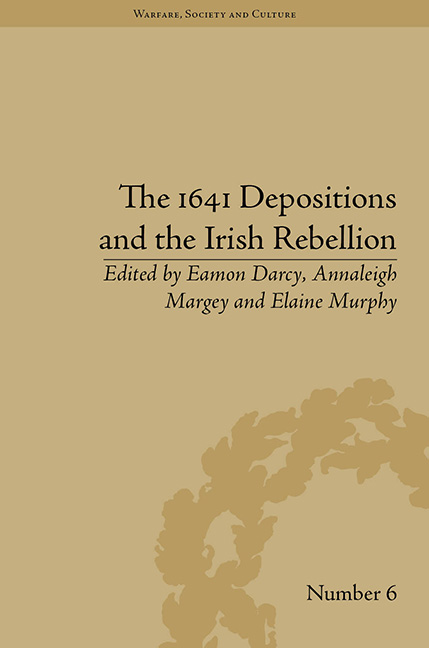Book contents
- Frontmatter
- CONTENTS
- Dedication
- Acknowledgements
- List of Contributors
- List of Figures and Tables
- List of Abbreviations
- Preface
- Introduction
- Part I The Outbreak of the Rebellion
- Part II Social Aspects of the Rebellion
- Part III Political and Military Aspects of the Rebellion
- Conclusion: The Rebellion in Text and Context
- Notes
- Index
Introduction
- Frontmatter
- CONTENTS
- Dedication
- Acknowledgements
- List of Contributors
- List of Figures and Tables
- List of Abbreviations
- Preface
- Introduction
- Part I The Outbreak of the Rebellion
- Part II Social Aspects of the Rebellion
- Part III Political and Military Aspects of the Rebellion
- Conclusion: The Rebellion in Text and Context
- Notes
- Index
Summary
Reflecting on nearly 350 years of the troubled historiography of the 1641 Depositions, Aidan Clarke commented that these statements ‘had been continuously evoked … but they were rarely opened in the process’. With a few notable exceptions scholars rarely used the depositions as a source in their own right for the turbulent 1640s let alone as a source for seventeenth-century Ireland. This was due in no small part to the nature of the collection itself. The 1641 Depositions comprise over 8,000 witness statements, describing the course of the 1641 rebellion and confederate wars in Ireland. In their original format they are a difficult source to engage with due to the sheer size of the collection, its deteriorating condition and its haphazard organization.
In October 2007, having received €1 million from the Irish Research Council for the Humanities and Social Sciences, the Arts and Humanities Research Council and the library of Trinity College Dublin, a team of academics from the Universities of Aberdeen, Cambridge and Trinity College, Dublin collaborated to digitize and transcribe the depositions. ‘The 1641 Depositions Project’, as this collaboration came to be known, ensured that for the first time, this rich source was made available to a wider audience. In October 2010, almost three hundred years after they were deposited in the library at Trinity College Dublin, the depositions were finally published online for all to interrogate and study (http://1641.tcd.ie).
After their publication, a community of scholars interested in the seventeenth century began interrogating these testimonies. This collection provides some of the fruits of the first research that made use of the online archive. The 1641 Depositions are, without doubt, an unrivalled source for the study of early modern Ireland. As this collection shows, they provide significant detail on all aspects of Irish life in the seventeenth century. As a resource, they have wide multidisciplinary appeal for historians, historical geographers, linguists, anthropologists, literary scholars and sociologists.
- Type
- Chapter
- Information
- The 1641 Depositions and the Irish Rebellion , pp. 1 - 6Publisher: Pickering & ChattoFirst published in: 2014



